A sea of passionate fans draped in their county colors converged on Croke Park in Dublin for the All-Ireland Gaelic Football Semi-Final Saturday afternoon, July 13, dreaming of their team’s chance to play in the championship.
They are the privileged ones as the field has now been narrowed down to four finalists: Armagh, Kerry, Donegal, and Galway.
On the card this afternoon is Armagh and Kerry.
Tomorrow, Donegal will meet Galway, with the winners to play for the championship in two weeks.
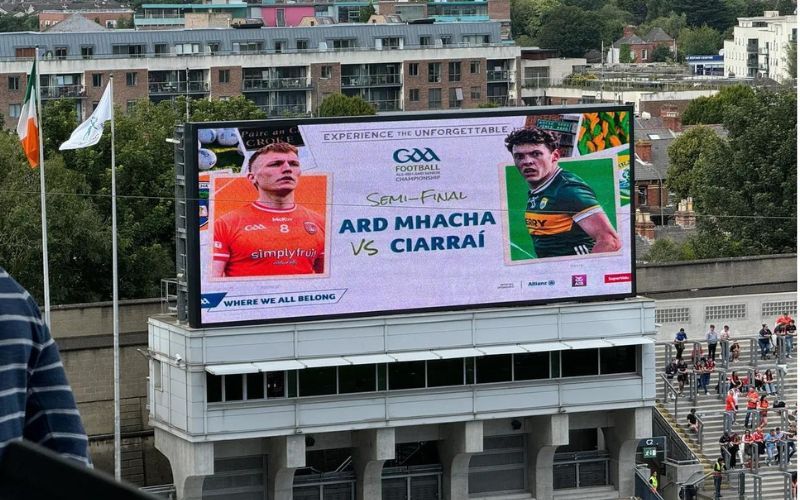
July 13, 2024: Armagh and Kerry face off for the All-Ireland Senior Football Championship semi-final in Dublin's Croke Park. (Len Clark)
The Celtic weather Gods provided a window of perfect weather with temperatures in the lower 60s for the match and it feels like October in July.
For those unfamiliar with Gaelic football, imagine a game that combines the strategic depth of American football with the agility and skill of soccer, and maybe even a little ice hockey and lacrosse thrown in for good measure.
No pads or protective gear is needed, just a net with a goal, a ball, and 15 players on each team playing on a field, or what they call a pitch, that is 130 meters by 80 meters, or nearly an American football field and a half long, and nearly a football field wide.
Scoring is simple, just put the ball over the net and between the goalposts for one point, or put the ball in the back of the net for three.
It’s the way that the scoring appears that may prove confusing to even the most ardent American sports enthusiast.
A team's score is given in the form of goals-points and separated by a hyphen.
For example, Mayo 1-3 – Dublin 0-2. The total points scored may be given in brackets for clarity: Mayo 1-3 (6) - Dublin 0-2 (2).
Broadcasters, or commentators, describe the scoring as follows: Mayo “One-Three” and Dublin “Two Points.”
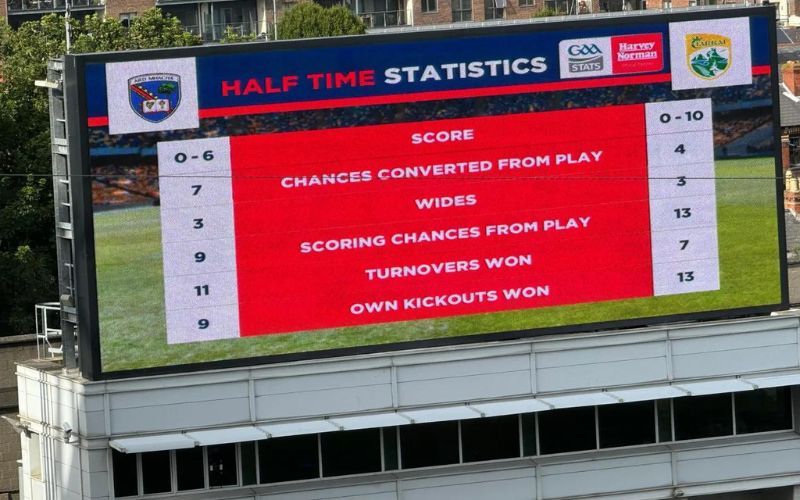
July 13, 2024: Half-time stats from the Armagh - Kerry semi-final in Dublin's Croke Park. (Len Clark)
Croke Park, with a capacity of 82,300, is the headquarters for the GAA and has held Gaelic sports since 1891.
Imagine Notre Dame Stadium hosting a national championship football game with the pageantry of the Indianapolis 500.
In about two hours the match will be over.
There are no long TV timeouts or in-game breaks, and the halftime is 15 minutes.
The match consists of two 35-minute halves. Extra time is added, for pauses or delays during regulation, and two extra periods of 10 minutes can be played if the teams are tied before a shootout will decide the winner of the game.
The fans, decked in their county colors, are divided throughout Croke Park in areas known as the Cusack, Davin, and Hogan stands, in addition to the famous Dineen or 'Hill 16,' in reference to the Easter Rising in 1916.
Thousands of others will watch and listen to the match via RTÉ, the Irish national broadcaster, in both English and Gaelic, and streamed around the world to the Irish diaspora in Chicago, Melbourne, etc., on GAA Go.
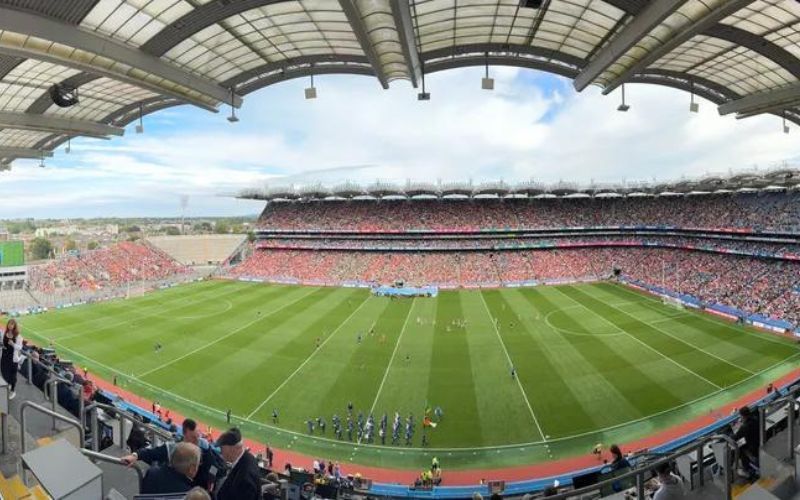
July 13, 2024: The view inside Croke Park for the 2024 All-Ireland Senior Football Championship semi-final between Armagh and Kerry. (Len Clark)
RTÉ broadcast veteran Pauric Lodge has the national call of the match on radio.
He not only has the responsibility of the match’s description but the duty to preserve history and carry forward the tradition of the game.
Imagine Pauric as Mark Jaynes of the Indianapolis 500 Radio Network with the versatility of Greg Rakestraw, where depending on the day of the week you have a different responsibility or game to cover, as he will also be tasked with the call of the GAA hurling final next week [July 21] when Clare meets Cork.
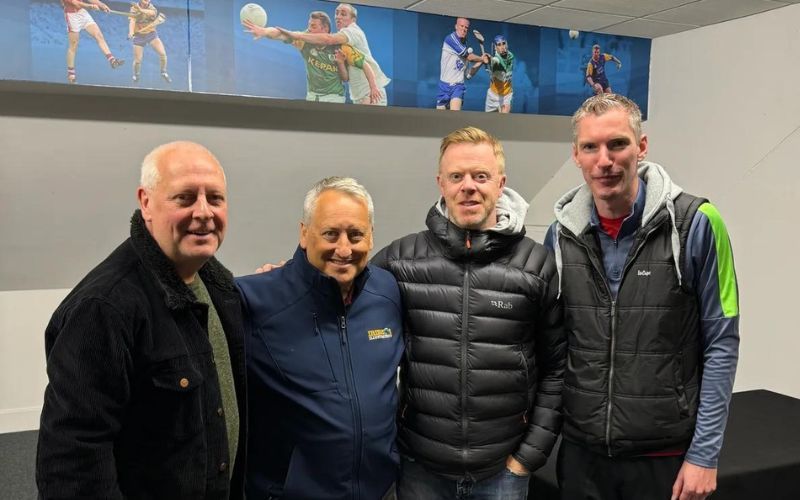
July 13, 2024: Len Clark, second from left, and Pauric Lodge, far right. (Len Clark)
Ireland is a world leader in sports broadcasting.
The first sports broadcast in Europe was the call of the GAA All-Ireland hurling final between Galway and Kilkenny on radio in 1926.
The press box is full of media professionals ready to provide nuances and information about the match to a media-savvy audience, like the crew from Radio Kerry.
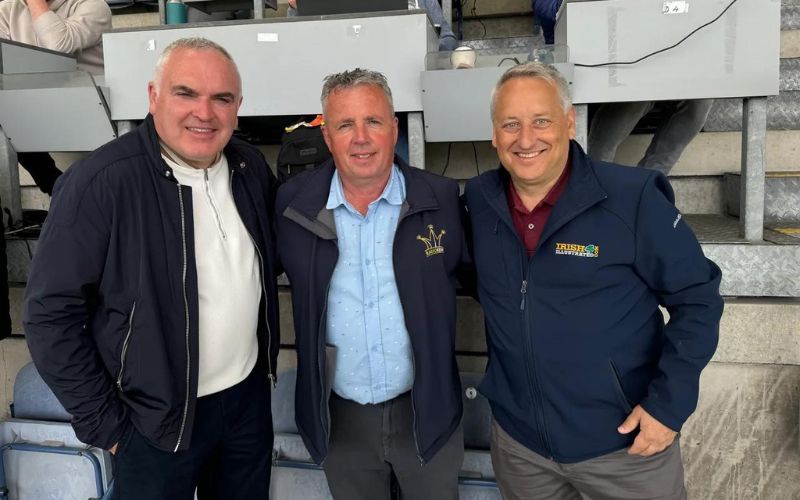
July 13, 2024: Len Clark, far right, with members of Radio Kerry in Croke Park. (Len Clark)
The Irish are media literate and consume local and national newspapers, still listen to the radio in the home, and consume over three hours of TV viewing each day while having to pay a TV license of €160 each year for the privilege.
The remote broadcast equipment used to call the game looks a little different, with European announcers preferring to use a “lip mic” to get the best sound quality that is tethered to a “desk” or what American broadcasters call a mixer.
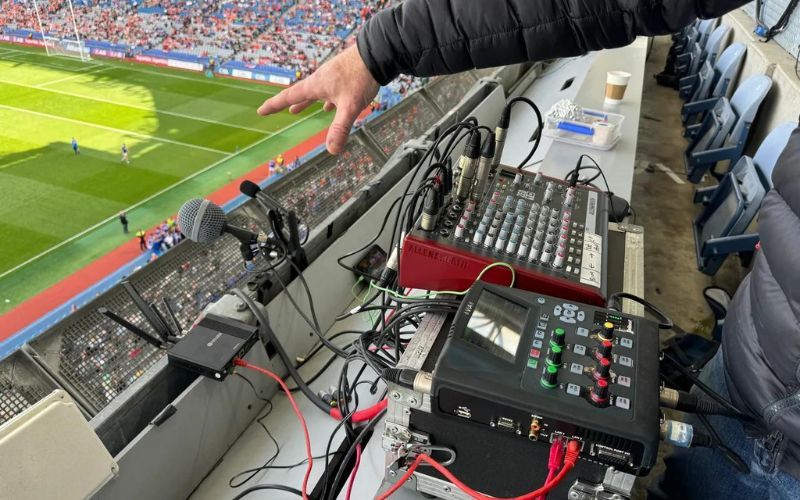
July 13, 2024: Inside the press box at Croke Park. (Len Clark)
Looking out over the stadium, you can see the intersection of where history meets tradition at Croke Park, and technology plays an important role in the match.
Video replays by “Hawk-Eye”, sponsored by a vision services company, determine if a goal has been scored, while big-screen monitors inform and entertain the fans.
The music system belts out the strains of U2 and David Bowie as the teams enter the pitch and head to midfield for the requisite team photo before the start of every game.
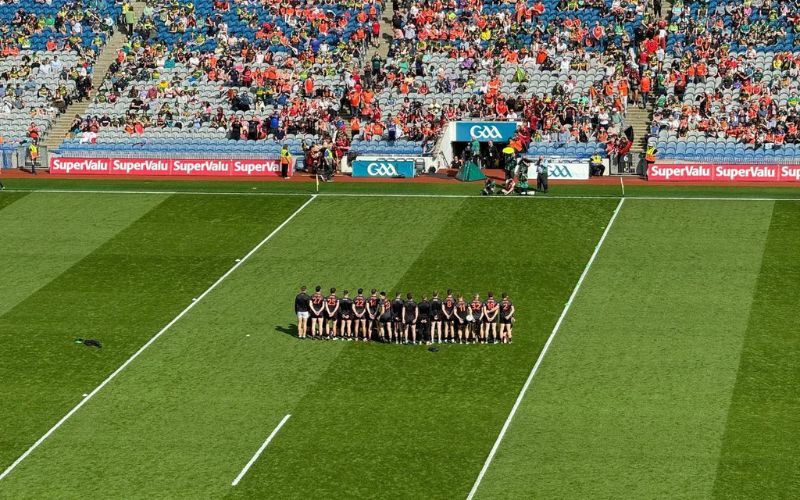
July 13, 2024: The Armagh side on the pitch for the All-Ireland Senior Football Championship semi-final. (Len Clark)
49 concession stands are dotted around Croke Park and are named “The Crossbar,” “Leather & Ash” for hurling, and “1884,” the year the GAA was founded. Many "pop-up" stands surround the stadium to provide creature comforts to the masses.
They feature your typical snack items and beverages, including beer. You can even bring your own food and beverage into certain areas of the stadium if it meets the requirements.
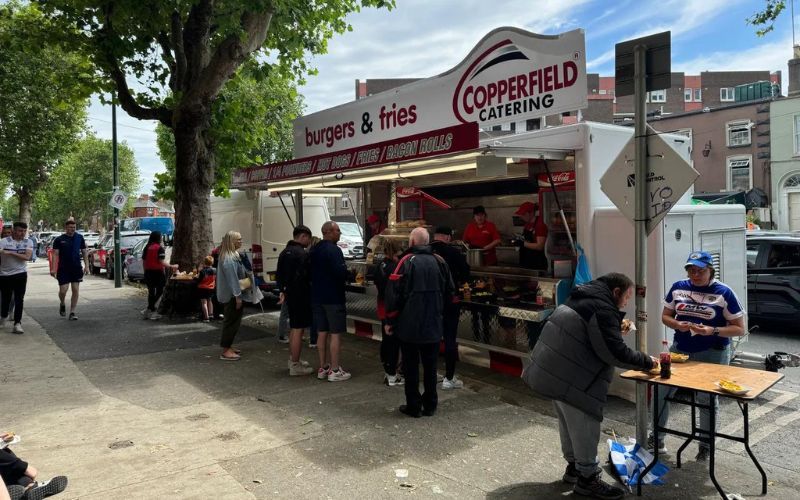
July 13, 2024: Concession stand at Croke Park. (Len Clark)
Getting a ticket to the All-Ireland Finals is like finding the golden ticket in a Willy Wonka movie. Prices range from €55 to over €100 per ticket.
Ireland Rail provides extra trains and special times to accommodate fans who come up to Dublin on the train. Ireland’s capital city is one of the most expensive cities in Europe, so helping fans as much as possible is paramount.
They arrive in the City Centre from Huston Station or Pearse Station and gather at a “local” for a bite, a few pints, and conversation before it’s time to make the pilgrimage up O’Connell Street to celebrate the game.
The colors of the counties mix as they proceed to the entry points, passing by vendors selling bucket hats, banners, and other promotional items.
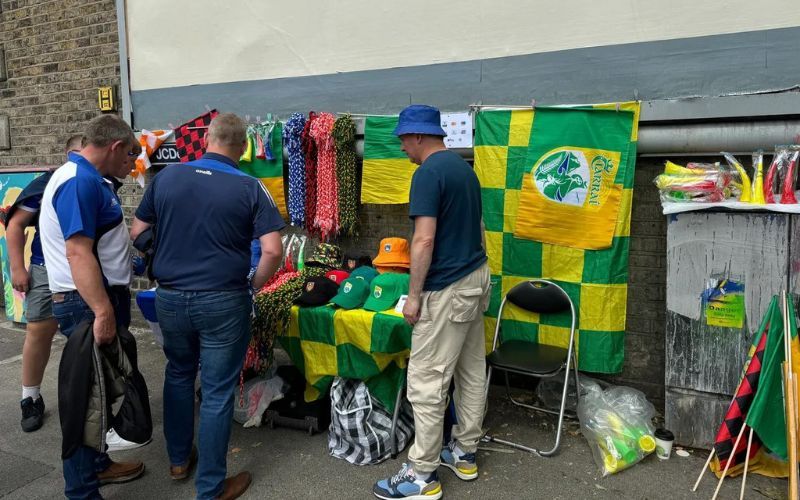
July 13, 2024: Vendors at Croke Park on All-Ireland Senior Football Championship semi-final day. (Len Clark)
The green and gold of Kerry is splashed with “Kerry” across the chest for sponsor Kerry Group. The O’Neills jerseys are worn by supporting fans and players, while the orange and white of Armagh, a team from the north, is adorned with Simply Fruit, a producer of ready-to-eat snacks, and Croke Park seems to be dominated in orange this afternoon.
I think this type of sponsorship is inevitable in the States.
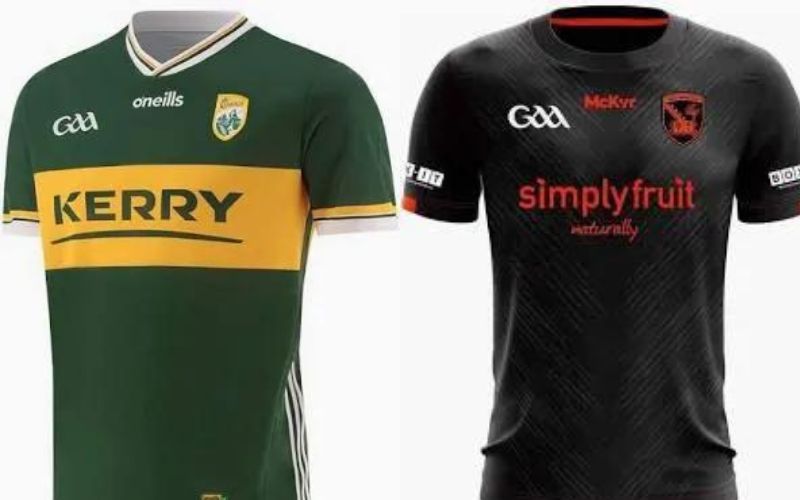
The Kerry GAA Jersey (left) and the Armagh GAA Jersey (right).
Prior to the start of the match, the Artane Band, from the Artane School of Music in Dublin, which has been in existence since 1872, parades around the pitch and performs the Irish national anthem prior to the throw-in.
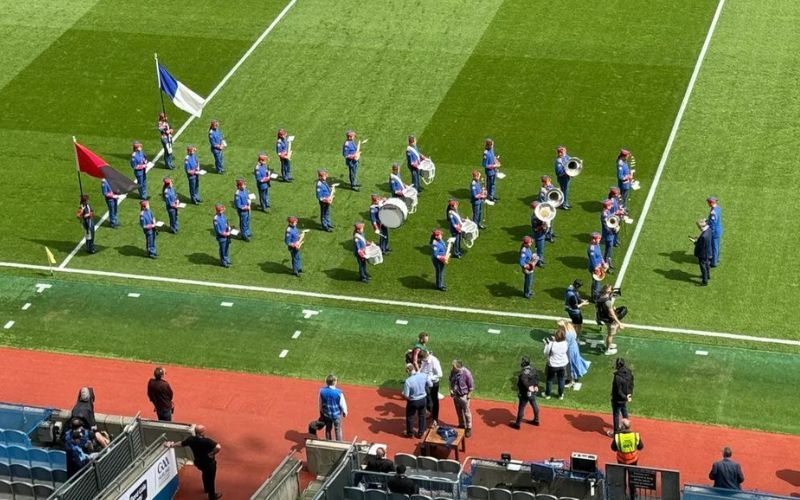
July 13, 2024: The Artane Band on the pitch in Croke Park ahead of the All-Ireland Senior Football Championship semi-final between Armagh and Kerry. (Len Clark)
I have attended several matches at Croke Park and have a special rapport with RTÉ, the GAA, and O’Neills. I’m developing a course on the history of the Gaelic Games to share my passion with students and media members in the US and they have proven to be invaluable resources.
This fall, my Notre Dame reports will feature me wearing a Notre Dame GAA jersey during my reports, with a link on how to purchase and support Notre Dame’s GAA club.
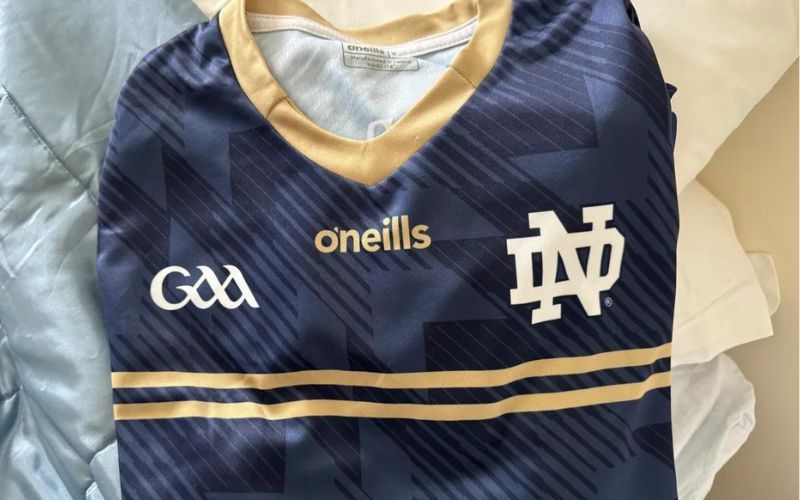
Notre Dame's GAA jersey. (Len Clark)
As the match is ready to begin, I find my way to my seat in the open-air press box on the Hogan Stand side, a floor up from where the coveted Sam Maguire Cup is on display.
The sights, sounds, and pageantry remind me of covering my first Indiana High School Basketball Tournament in the early 1980s, where radio stations from around the state displayed its banner and colors proudly, with the hometown stations of the finalists having the best seats courtside.
Today, I have the best seat in the house and am just a few feet away from RTÉ announcer Pauric Lodge.
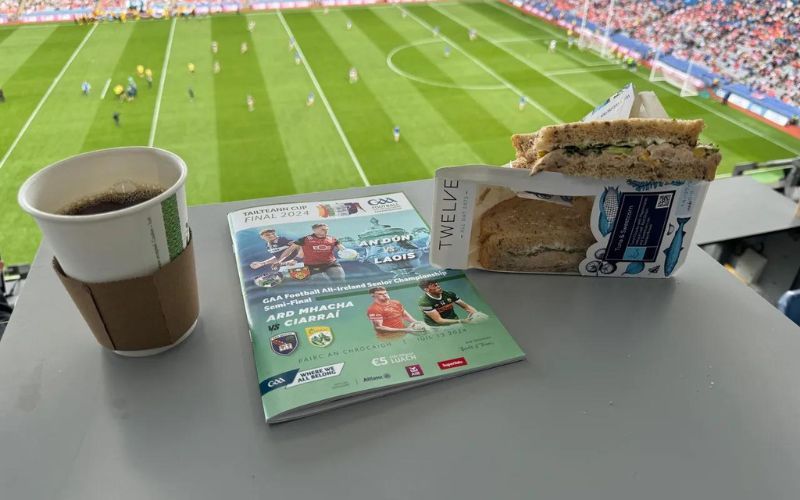
July 13, 2023: View from the press box in Croke Park. (Len Clark)
You can feel the excitement and see it in the eyes of the fans and media members as a new king of GAA football will be crowned this year after reigning champ Dublin was defeated in this year’s quarterfinals by Galway.
Today, more than pride is on the line.
What’s at stake is immortality, as the winner of the All-Ireland will have its named etched in the annals of GAA history and live forever.
I’m all in and ready for the match to begin.
Now, please excuse me, as I have a date with history and want to savor every moment ...
⏪Take a look back at how @Armagh_GAA booked their spot in the 2024 All-Ireland Final. It took extra-time to secure victory in a titanic clash against Kerry.? Can they claim the Sam Maguire this weekend??#GAANOW pic.twitter.com/qylmPUP2hK
— The GAA (@officialgaa) July 26, 2024
(Ultimately, Armagh defeated Kerry in extra time, 1-18 (21) to 1-16 (19). The following day, Galway defeated Donegal 1-14 (17) to 1-15 (16), meaning Armagh and Galway are facing off in the 2024 All-Ireland Senior Football Championship final on July 28.)
*Len Clark, Ph.D. has an eclectic background in higher education, media, and sports. He covers Notre Dame athletics using the latest emerging media technologies and was recently in Ireland working on developing a course on the history of Gaelic Games. This Fall, his Notre Dame reports will be sponsored by O’Neills and feature him wearing a Notre Dame GAA jersey, with a link to purchase various GAA jerseys to support Notre Dame GAA. He has become obsessed with GAA football and leans towards rooting for Kerry, much to the disappointment of his girlfriend who is from Mayo.
You can follow Len Clark on Facebook at Notre Dame - Irish 101 and on X at @LenND1.
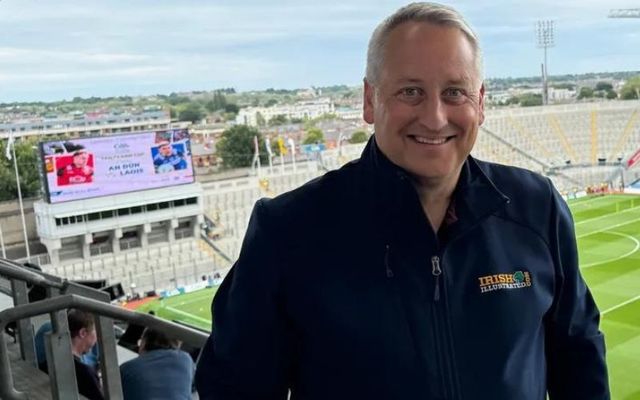



Comments